Impact of COVID-19 Pandemic on Public Support for Development Aid
VerifiedAdded on 2023/06/13
|9
|3117
|403
Report
AI Summary
This report investigates the effects of the COVID-19 pandemic on public support for development aid in donor countries. It highlights how the pandemic has forced high-economy nations to prioritize domestic development, potentially reducing aid to developing countries. The report discusses the economic impact of COVID-19 on both developed and developing nations, focusing on the increased need for domestic support and healthcare investment in donor countries. It explores how public opinion in donor countries, particularly in democracies like the United States and the United Kingdom, influences decisions regarding foreign aid. The analysis includes survey experiments that reveal a decline in support for aid when citizens are concerned about their own country's financial stability. The report also notes emerging trends, such as the shift in foreign aid towards addressing immediate health and social assistance needs related to COVID-19, and how this may affect funding for other critical sectors. It concludes by emphasizing the potential for increased cooperation if the public becomes more aware of the pandemic's severe impact on developing nations. Desklib offers a range of resources, including past papers and solved assignments, to support students in their academic endeavors.
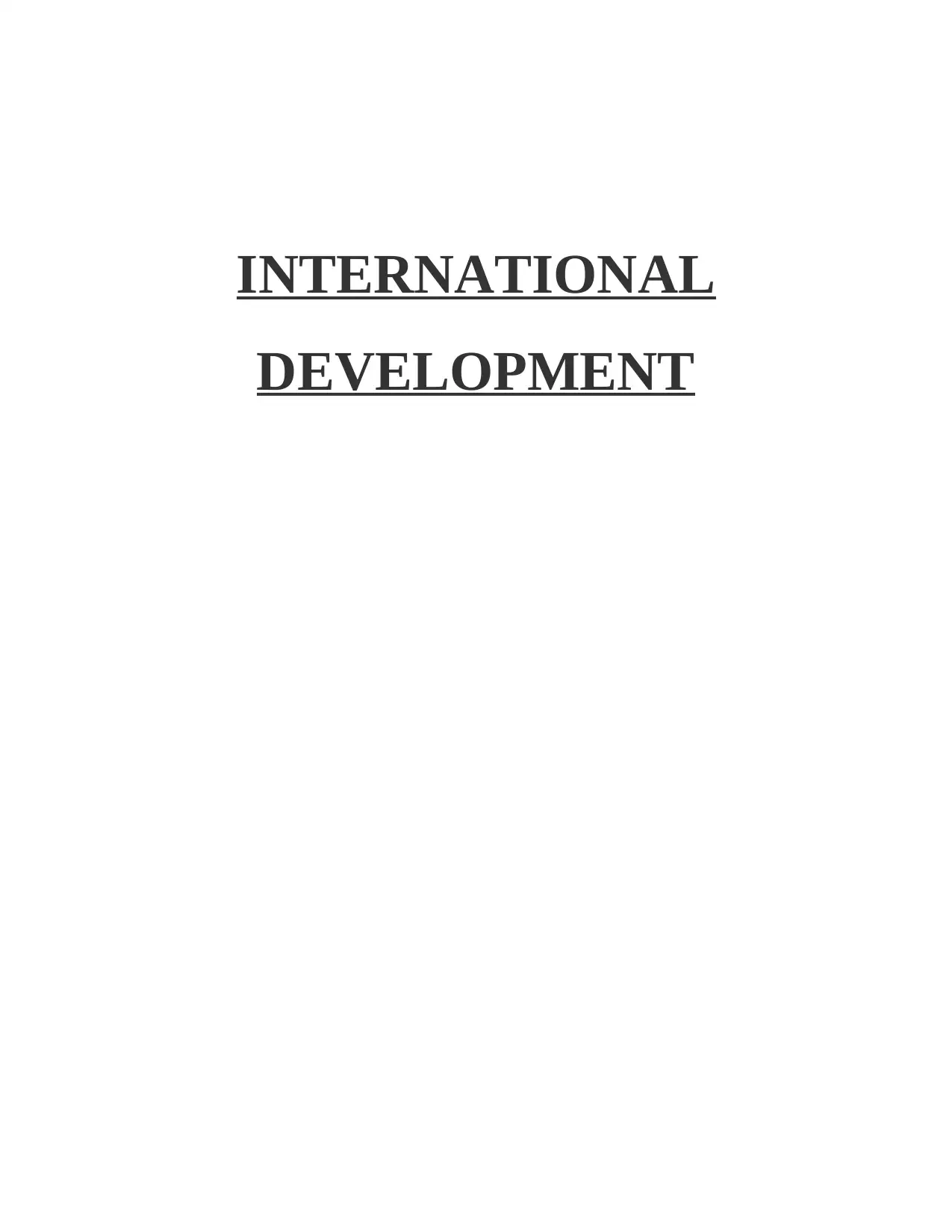
INTERNATIONAL
DEVELOPMENT
DEVELOPMENT
Paraphrase This Document
Need a fresh take? Get an instant paraphrase of this document with our AI Paraphraser
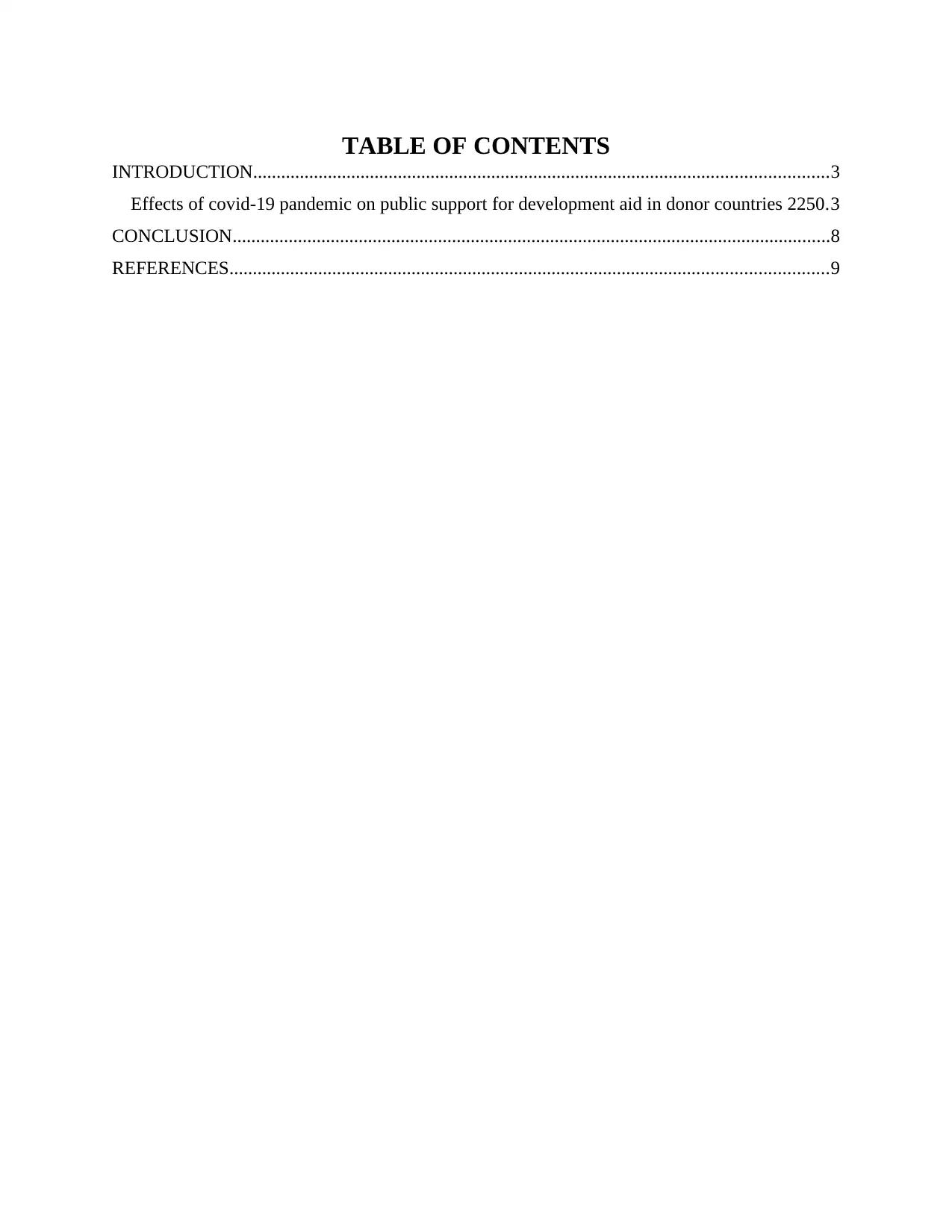
TABLE OF CONTENTS
INTRODUCTION...........................................................................................................................3
Effects of covid-19 pandemic on public support for development aid in donor countries 2250.3
CONCLUSION................................................................................................................................8
REFERENCES................................................................................................................................9
INTRODUCTION...........................................................................................................................3
Effects of covid-19 pandemic on public support for development aid in donor countries 2250.3
CONCLUSION................................................................................................................................8
REFERENCES................................................................................................................................9
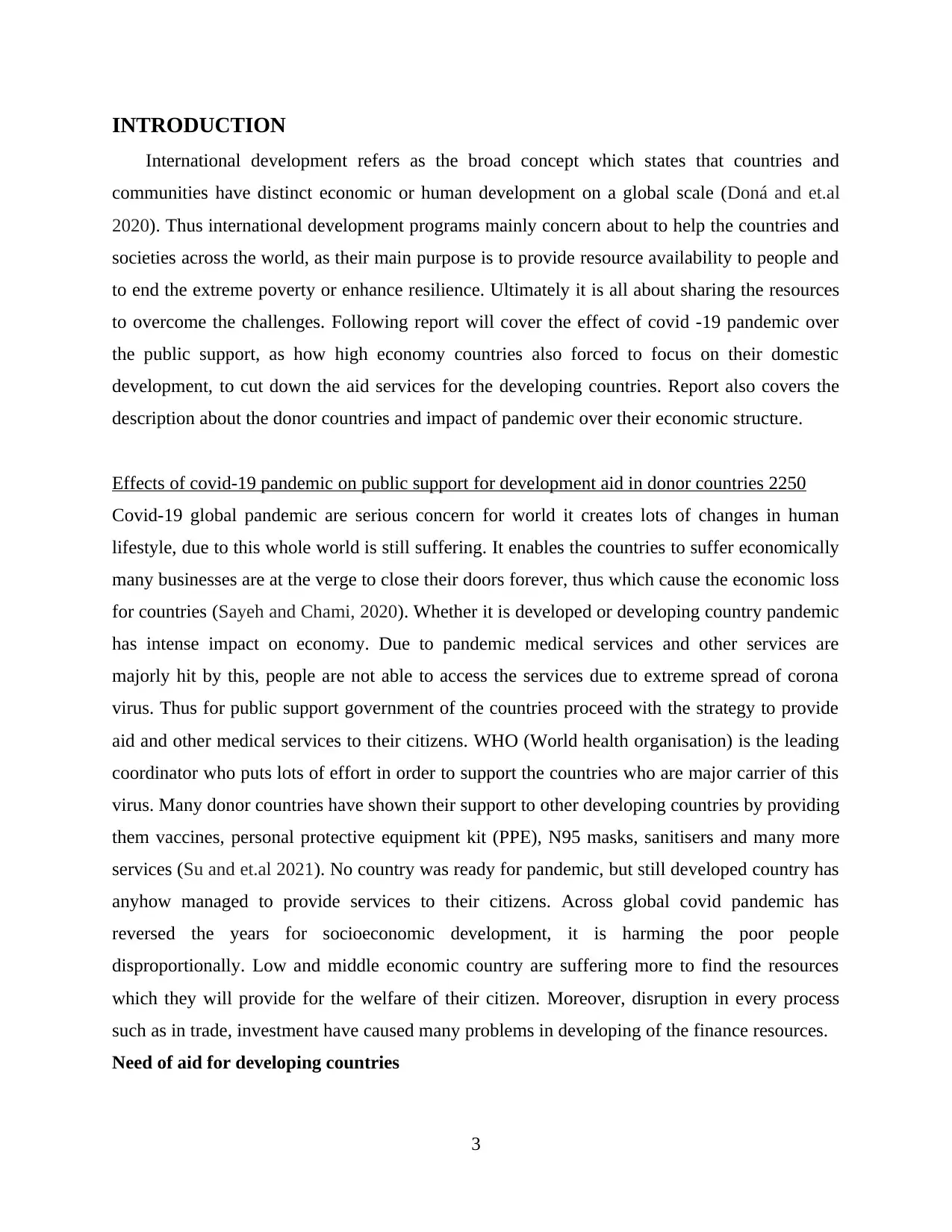
INTRODUCTION
International development refers as the broad concept which states that countries and
communities have distinct economic or human development on a global scale (Doná and et.al
2020). Thus international development programs mainly concern about to help the countries and
societies across the world, as their main purpose is to provide resource availability to people and
to end the extreme poverty or enhance resilience. Ultimately it is all about sharing the resources
to overcome the challenges. Following report will cover the effect of covid -19 pandemic over
the public support, as how high economy countries also forced to focus on their domestic
development, to cut down the aid services for the developing countries. Report also covers the
description about the donor countries and impact of pandemic over their economic structure.
Effects of covid-19 pandemic on public support for development aid in donor countries 2250
Covid-19 global pandemic are serious concern for world it creates lots of changes in human
lifestyle, due to this whole world is still suffering. It enables the countries to suffer economically
many businesses are at the verge to close their doors forever, thus which cause the economic loss
for countries (Sayeh and Chami, 2020). Whether it is developed or developing country pandemic
has intense impact on economy. Due to pandemic medical services and other services are
majorly hit by this, people are not able to access the services due to extreme spread of corona
virus. Thus for public support government of the countries proceed with the strategy to provide
aid and other medical services to their citizens. WHO (World health organisation) is the leading
coordinator who puts lots of effort in order to support the countries who are major carrier of this
virus. Many donor countries have shown their support to other developing countries by providing
them vaccines, personal protective equipment kit (PPE), N95 masks, sanitisers and many more
services (Su and et.al 2021). No country was ready for pandemic, but still developed country has
anyhow managed to provide services to their citizens. Across global covid pandemic has
reversed the years for socioeconomic development, it is harming the poor people
disproportionally. Low and middle economic country are suffering more to find the resources
which they will provide for the welfare of their citizen. Moreover, disruption in every process
such as in trade, investment have caused many problems in developing of the finance resources.
Need of aid for developing countries
3
International development refers as the broad concept which states that countries and
communities have distinct economic or human development on a global scale (Doná and et.al
2020). Thus international development programs mainly concern about to help the countries and
societies across the world, as their main purpose is to provide resource availability to people and
to end the extreme poverty or enhance resilience. Ultimately it is all about sharing the resources
to overcome the challenges. Following report will cover the effect of covid -19 pandemic over
the public support, as how high economy countries also forced to focus on their domestic
development, to cut down the aid services for the developing countries. Report also covers the
description about the donor countries and impact of pandemic over their economic structure.
Effects of covid-19 pandemic on public support for development aid in donor countries 2250
Covid-19 global pandemic are serious concern for world it creates lots of changes in human
lifestyle, due to this whole world is still suffering. It enables the countries to suffer economically
many businesses are at the verge to close their doors forever, thus which cause the economic loss
for countries (Sayeh and Chami, 2020). Whether it is developed or developing country pandemic
has intense impact on economy. Due to pandemic medical services and other services are
majorly hit by this, people are not able to access the services due to extreme spread of corona
virus. Thus for public support government of the countries proceed with the strategy to provide
aid and other medical services to their citizens. WHO (World health organisation) is the leading
coordinator who puts lots of effort in order to support the countries who are major carrier of this
virus. Many donor countries have shown their support to other developing countries by providing
them vaccines, personal protective equipment kit (PPE), N95 masks, sanitisers and many more
services (Su and et.al 2021). No country was ready for pandemic, but still developed country has
anyhow managed to provide services to their citizens. Across global covid pandemic has
reversed the years for socioeconomic development, it is harming the poor people
disproportionally. Low and middle economic country are suffering more to find the resources
which they will provide for the welfare of their citizen. Moreover, disruption in every process
such as in trade, investment have caused many problems in developing of the finance resources.
Need of aid for developing countries
3
⊘ This is a preview!⊘
Do you want full access?
Subscribe today to unlock all pages.

Trusted by 1+ million students worldwide
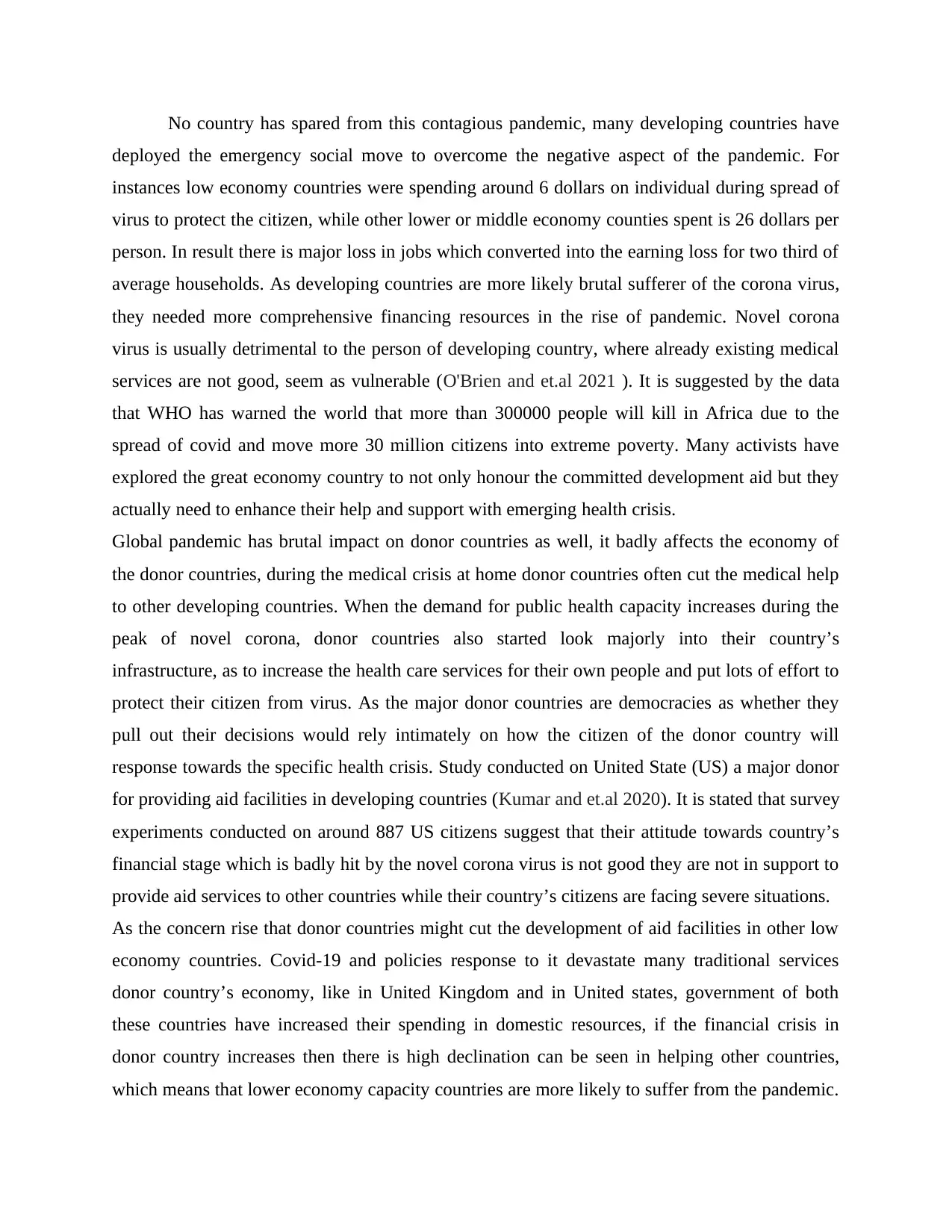
No country has spared from this contagious pandemic, many developing countries have
deployed the emergency social move to overcome the negative aspect of the pandemic. For
instances low economy countries were spending around 6 dollars on individual during spread of
virus to protect the citizen, while other lower or middle economy counties spent is 26 dollars per
person. In result there is major loss in jobs which converted into the earning loss for two third of
average households. As developing countries are more likely brutal sufferer of the corona virus,
they needed more comprehensive financing resources in the rise of pandemic. Novel corona
virus is usually detrimental to the person of developing country, where already existing medical
services are not good, seem as vulnerable (O'Brien and et.al 2021 ). It is suggested by the data
that WHO has warned the world that more than 300000 people will kill in Africa due to the
spread of covid and move more 30 million citizens into extreme poverty. Many activists have
explored the great economy country to not only honour the committed development aid but they
actually need to enhance their help and support with emerging health crisis.
Global pandemic has brutal impact on donor countries as well, it badly affects the economy of
the donor countries, during the medical crisis at home donor countries often cut the medical help
to other developing countries. When the demand for public health capacity increases during the
peak of novel corona, donor countries also started look majorly into their country’s
infrastructure, as to increase the health care services for their own people and put lots of effort to
protect their citizen from virus. As the major donor countries are democracies as whether they
pull out their decisions would rely intimately on how the citizen of the donor country will
response towards the specific health crisis. Study conducted on United State (US) a major donor
for providing aid facilities in developing countries (Kumar and et.al 2020). It is stated that survey
experiments conducted on around 887 US citizens suggest that their attitude towards country’s
financial stage which is badly hit by the novel corona virus is not good they are not in support to
provide aid services to other countries while their country’s citizens are facing severe situations.
As the concern rise that donor countries might cut the development of aid facilities in other low
economy countries. Covid-19 and policies response to it devastate many traditional services
donor country’s economy, like in United Kingdom and in United states, government of both
these countries have increased their spending in domestic resources, if the financial crisis in
donor country increases then there is high declination can be seen in helping other countries,
which means that lower economy capacity countries are more likely to suffer from the pandemic.
deployed the emergency social move to overcome the negative aspect of the pandemic. For
instances low economy countries were spending around 6 dollars on individual during spread of
virus to protect the citizen, while other lower or middle economy counties spent is 26 dollars per
person. In result there is major loss in jobs which converted into the earning loss for two third of
average households. As developing countries are more likely brutal sufferer of the corona virus,
they needed more comprehensive financing resources in the rise of pandemic. Novel corona
virus is usually detrimental to the person of developing country, where already existing medical
services are not good, seem as vulnerable (O'Brien and et.al 2021 ). It is suggested by the data
that WHO has warned the world that more than 300000 people will kill in Africa due to the
spread of covid and move more 30 million citizens into extreme poverty. Many activists have
explored the great economy country to not only honour the committed development aid but they
actually need to enhance their help and support with emerging health crisis.
Global pandemic has brutal impact on donor countries as well, it badly affects the economy of
the donor countries, during the medical crisis at home donor countries often cut the medical help
to other developing countries. When the demand for public health capacity increases during the
peak of novel corona, donor countries also started look majorly into their country’s
infrastructure, as to increase the health care services for their own people and put lots of effort to
protect their citizen from virus. As the major donor countries are democracies as whether they
pull out their decisions would rely intimately on how the citizen of the donor country will
response towards the specific health crisis. Study conducted on United State (US) a major donor
for providing aid facilities in developing countries (Kumar and et.al 2020). It is stated that survey
experiments conducted on around 887 US citizens suggest that their attitude towards country’s
financial stage which is badly hit by the novel corona virus is not good they are not in support to
provide aid services to other countries while their country’s citizens are facing severe situations.
As the concern rise that donor countries might cut the development of aid facilities in other low
economy countries. Covid-19 and policies response to it devastate many traditional services
donor country’s economy, like in United Kingdom and in United states, government of both
these countries have increased their spending in domestic resources, if the financial crisis in
donor country increases then there is high declination can be seen in helping other countries,
which means that lower economy capacity countries are more likely to suffer from the pandemic.
Paraphrase This Document
Need a fresh take? Get an instant paraphrase of this document with our AI Paraphraser
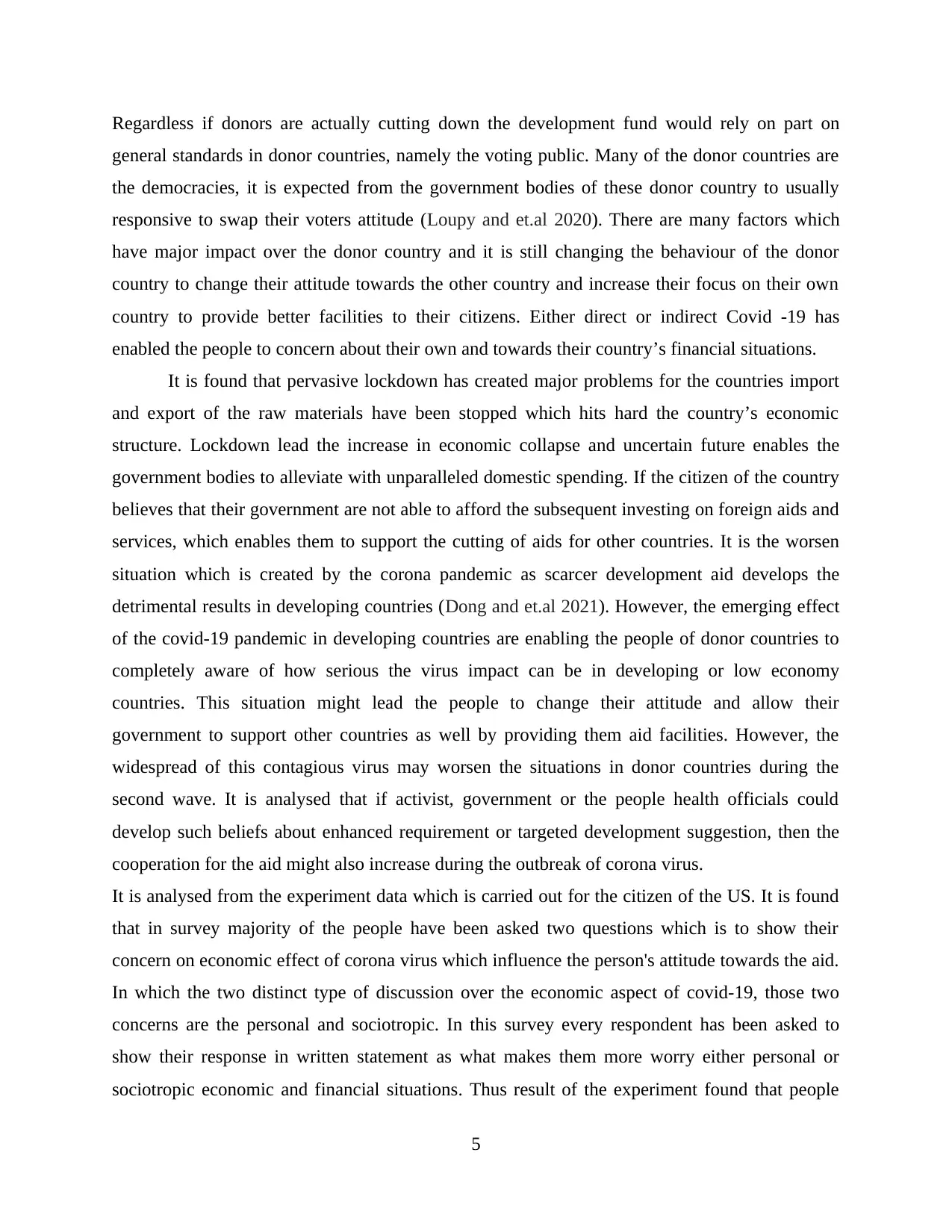
Regardless if donors are actually cutting down the development fund would rely on part on
general standards in donor countries, namely the voting public. Many of the donor countries are
the democracies, it is expected from the government bodies of these donor country to usually
responsive to swap their voters attitude (Loupy and et.al 2020). There are many factors which
have major impact over the donor country and it is still changing the behaviour of the donor
country to change their attitude towards the other country and increase their focus on their own
country to provide better facilities to their citizens. Either direct or indirect Covid -19 has
enabled the people to concern about their own and towards their country’s financial situations.
It is found that pervasive lockdown has created major problems for the countries import
and export of the raw materials have been stopped which hits hard the country’s economic
structure. Lockdown lead the increase in economic collapse and uncertain future enables the
government bodies to alleviate with unparalleled domestic spending. If the citizen of the country
believes that their government are not able to afford the subsequent investing on foreign aids and
services, which enables them to support the cutting of aids for other countries. It is the worsen
situation which is created by the corona pandemic as scarcer development aid develops the
detrimental results in developing countries (Dong and et.al 2021). However, the emerging effect
of the covid-19 pandemic in developing countries are enabling the people of donor countries to
completely aware of how serious the virus impact can be in developing or low economy
countries. This situation might lead the people to change their attitude and allow their
government to support other countries as well by providing them aid facilities. However, the
widespread of this contagious virus may worsen the situations in donor countries during the
second wave. It is analysed that if activist, government or the people health officials could
develop such beliefs about enhanced requirement or targeted development suggestion, then the
cooperation for the aid might also increase during the outbreak of corona virus.
It is analysed from the experiment data which is carried out for the citizen of the US. It is found
that in survey majority of the people have been asked two questions which is to show their
concern on economic effect of corona virus which influence the person's attitude towards the aid.
In which the two distinct type of discussion over the economic aspect of covid-19, those two
concerns are the personal and sociotropic. In this survey every respondent has been asked to
show their response in written statement as what makes them more worry either personal or
sociotropic economic and financial situations. Thus result of the experiment found that people
5
general standards in donor countries, namely the voting public. Many of the donor countries are
the democracies, it is expected from the government bodies of these donor country to usually
responsive to swap their voters attitude (Loupy and et.al 2020). There are many factors which
have major impact over the donor country and it is still changing the behaviour of the donor
country to change their attitude towards the other country and increase their focus on their own
country to provide better facilities to their citizens. Either direct or indirect Covid -19 has
enabled the people to concern about their own and towards their country’s financial situations.
It is found that pervasive lockdown has created major problems for the countries import
and export of the raw materials have been stopped which hits hard the country’s economic
structure. Lockdown lead the increase in economic collapse and uncertain future enables the
government bodies to alleviate with unparalleled domestic spending. If the citizen of the country
believes that their government are not able to afford the subsequent investing on foreign aids and
services, which enables them to support the cutting of aids for other countries. It is the worsen
situation which is created by the corona pandemic as scarcer development aid develops the
detrimental results in developing countries (Dong and et.al 2021). However, the emerging effect
of the covid-19 pandemic in developing countries are enabling the people of donor countries to
completely aware of how serious the virus impact can be in developing or low economy
countries. This situation might lead the people to change their attitude and allow their
government to support other countries as well by providing them aid facilities. However, the
widespread of this contagious virus may worsen the situations in donor countries during the
second wave. It is analysed that if activist, government or the people health officials could
develop such beliefs about enhanced requirement or targeted development suggestion, then the
cooperation for the aid might also increase during the outbreak of corona virus.
It is analysed from the experiment data which is carried out for the citizen of the US. It is found
that in survey majority of the people have been asked two questions which is to show their
concern on economic effect of corona virus which influence the person's attitude towards the aid.
In which the two distinct type of discussion over the economic aspect of covid-19, those two
concerns are the personal and sociotropic. In this survey every respondent has been asked to
show their response in written statement as what makes them more worry either personal or
sociotropic economic and financial situations. Thus result of the experiment found that people
5
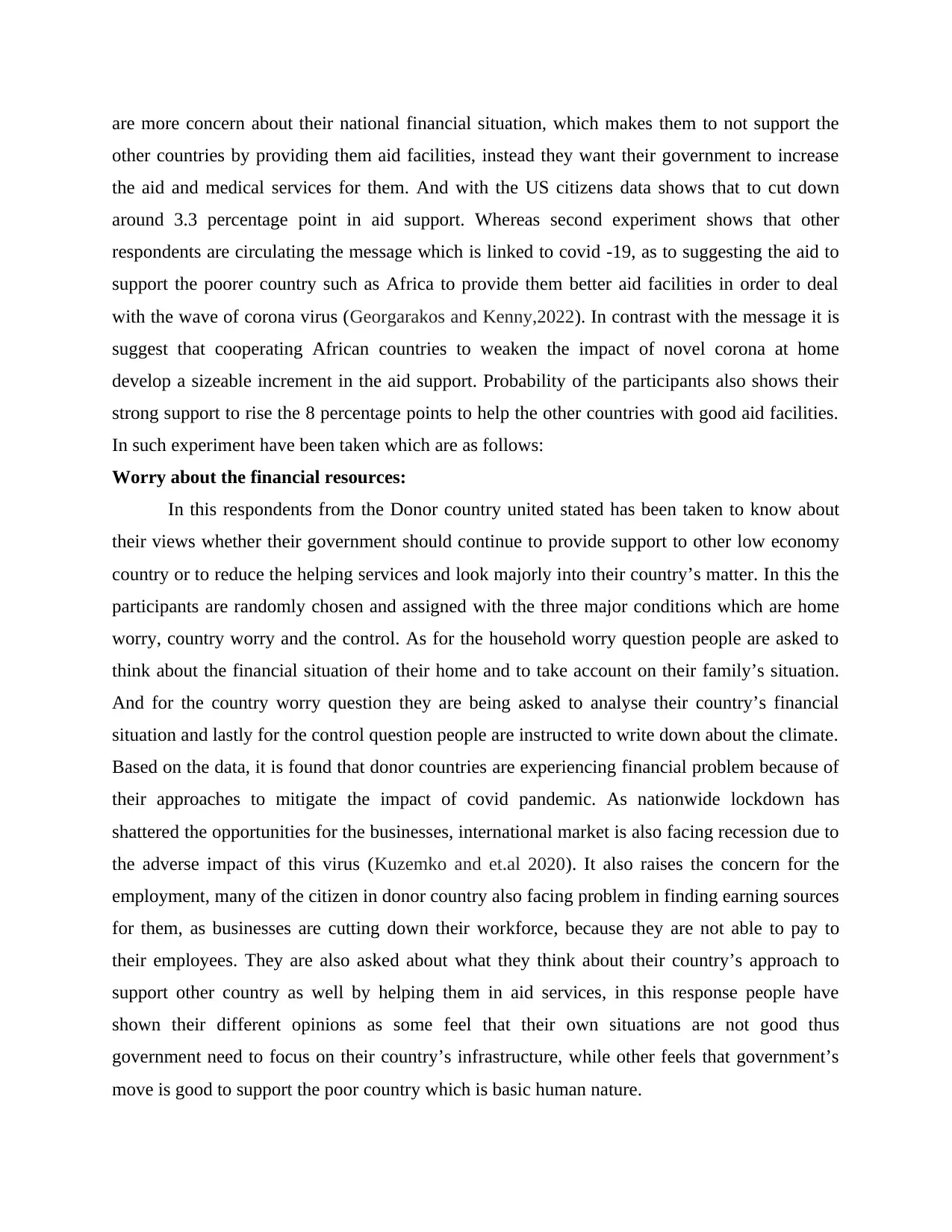
are more concern about their national financial situation, which makes them to not support the
other countries by providing them aid facilities, instead they want their government to increase
the aid and medical services for them. And with the US citizens data shows that to cut down
around 3.3 percentage point in aid support. Whereas second experiment shows that other
respondents are circulating the message which is linked to covid -19, as to suggesting the aid to
support the poorer country such as Africa to provide them better aid facilities in order to deal
with the wave of corona virus (Georgarakos and Kenny,2022). In contrast with the message it is
suggest that cooperating African countries to weaken the impact of novel corona at home
develop a sizeable increment in the aid support. Probability of the participants also shows their
strong support to rise the 8 percentage points to help the other countries with good aid facilities.
In such experiment have been taken which are as follows:
Worry about the financial resources:
In this respondents from the Donor country united stated has been taken to know about
their views whether their government should continue to provide support to other low economy
country or to reduce the helping services and look majorly into their country’s matter. In this the
participants are randomly chosen and assigned with the three major conditions which are home
worry, country worry and the control. As for the household worry question people are asked to
think about the financial situation of their home and to take account on their family’s situation.
And for the country worry question they are being asked to analyse their country’s financial
situation and lastly for the control question people are instructed to write down about the climate.
Based on the data, it is found that donor countries are experiencing financial problem because of
their approaches to mitigate the impact of covid pandemic. As nationwide lockdown has
shattered the opportunities for the businesses, international market is also facing recession due to
the adverse impact of this virus (Kuzemko and et.al 2020). It also raises the concern for the
employment, many of the citizen in donor country also facing problem in finding earning sources
for them, as businesses are cutting down their workforce, because they are not able to pay to
their employees. They are also asked about what they think about their country’s approach to
support other country as well by helping them in aid services, in this response people have
shown their different opinions as some feel that their own situations are not good thus
government need to focus on their country’s infrastructure, while other feels that government’s
move is good to support the poor country which is basic human nature.
other countries by providing them aid facilities, instead they want their government to increase
the aid and medical services for them. And with the US citizens data shows that to cut down
around 3.3 percentage point in aid support. Whereas second experiment shows that other
respondents are circulating the message which is linked to covid -19, as to suggesting the aid to
support the poorer country such as Africa to provide them better aid facilities in order to deal
with the wave of corona virus (Georgarakos and Kenny,2022). In contrast with the message it is
suggest that cooperating African countries to weaken the impact of novel corona at home
develop a sizeable increment in the aid support. Probability of the participants also shows their
strong support to rise the 8 percentage points to help the other countries with good aid facilities.
In such experiment have been taken which are as follows:
Worry about the financial resources:
In this respondents from the Donor country united stated has been taken to know about
their views whether their government should continue to provide support to other low economy
country or to reduce the helping services and look majorly into their country’s matter. In this the
participants are randomly chosen and assigned with the three major conditions which are home
worry, country worry and the control. As for the household worry question people are asked to
think about the financial situation of their home and to take account on their family’s situation.
And for the country worry question they are being asked to analyse their country’s financial
situation and lastly for the control question people are instructed to write down about the climate.
Based on the data, it is found that donor countries are experiencing financial problem because of
their approaches to mitigate the impact of covid pandemic. As nationwide lockdown has
shattered the opportunities for the businesses, international market is also facing recession due to
the adverse impact of this virus (Kuzemko and et.al 2020). It also raises the concern for the
employment, many of the citizen in donor country also facing problem in finding earning sources
for them, as businesses are cutting down their workforce, because they are not able to pay to
their employees. They are also asked about what they think about their country’s approach to
support other country as well by helping them in aid services, in this response people have
shown their different opinions as some feel that their own situations are not good thus
government need to focus on their country’s infrastructure, while other feels that government’s
move is good to support the poor country which is basic human nature.
⊘ This is a preview!⊘
Do you want full access?
Subscribe today to unlock all pages.

Trusted by 1+ million students worldwide
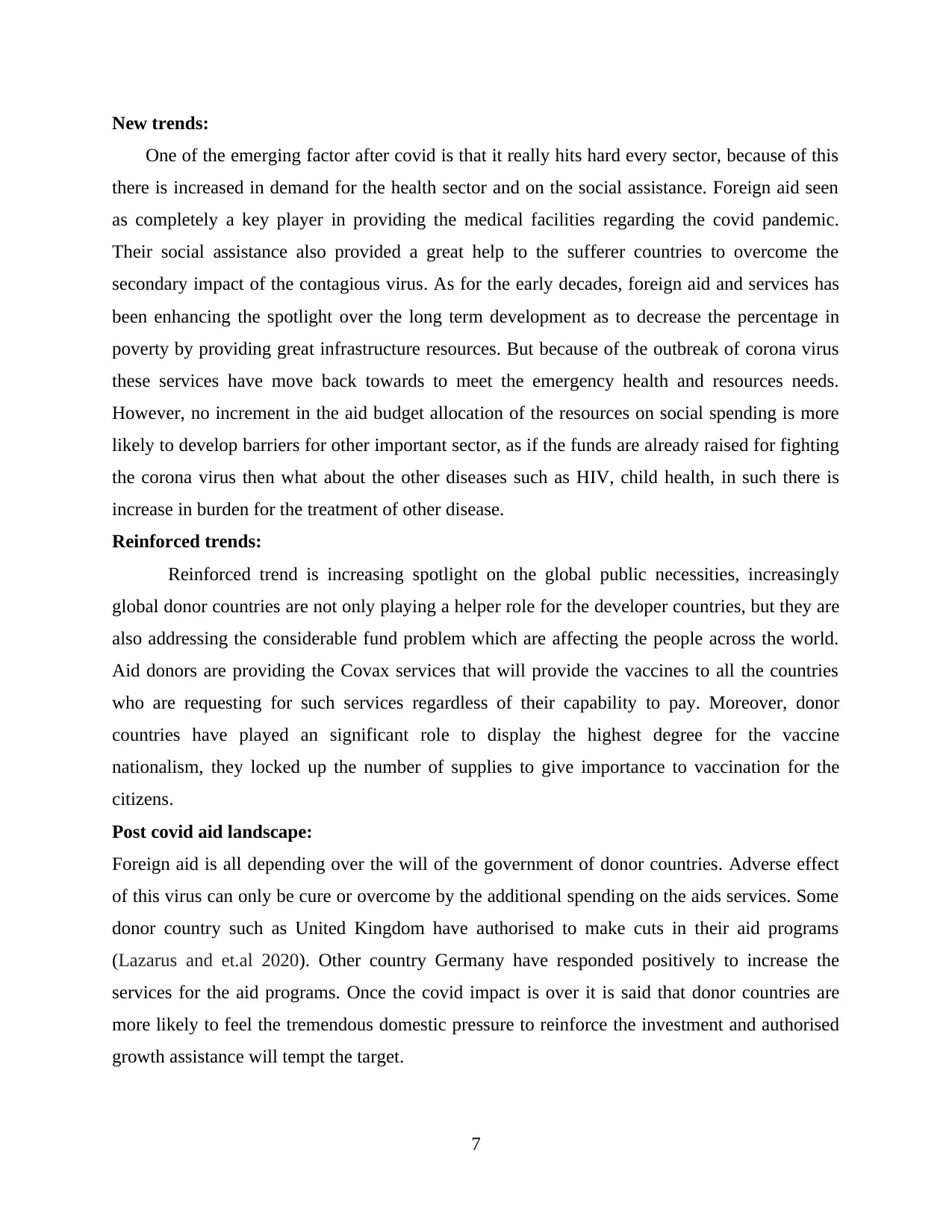
New trends:
One of the emerging factor after covid is that it really hits hard every sector, because of this
there is increased in demand for the health sector and on the social assistance. Foreign aid seen
as completely a key player in providing the medical facilities regarding the covid pandemic.
Their social assistance also provided a great help to the sufferer countries to overcome the
secondary impact of the contagious virus. As for the early decades, foreign aid and services has
been enhancing the spotlight over the long term development as to decrease the percentage in
poverty by providing great infrastructure resources. But because of the outbreak of corona virus
these services have move back towards to meet the emergency health and resources needs.
However, no increment in the aid budget allocation of the resources on social spending is more
likely to develop barriers for other important sector, as if the funds are already raised for fighting
the corona virus then what about the other diseases such as HIV, child health, in such there is
increase in burden for the treatment of other disease.
Reinforced trends:
Reinforced trend is increasing spotlight on the global public necessities, increasingly
global donor countries are not only playing a helper role for the developer countries, but they are
also addressing the considerable fund problem which are affecting the people across the world.
Aid donors are providing the Covax services that will provide the vaccines to all the countries
who are requesting for such services regardless of their capability to pay. Moreover, donor
countries have played an significant role to display the highest degree for the vaccine
nationalism, they locked up the number of supplies to give importance to vaccination for the
citizens.
Post covid aid landscape:
Foreign aid is all depending over the will of the government of donor countries. Adverse effect
of this virus can only be cure or overcome by the additional spending on the aids services. Some
donor country such as United Kingdom have authorised to make cuts in their aid programs
(Lazarus and et.al 2020). Other country Germany have responded positively to increase the
services for the aid programs. Once the covid impact is over it is said that donor countries are
more likely to feel the tremendous domestic pressure to reinforce the investment and authorised
growth assistance will tempt the target.
7
One of the emerging factor after covid is that it really hits hard every sector, because of this
there is increased in demand for the health sector and on the social assistance. Foreign aid seen
as completely a key player in providing the medical facilities regarding the covid pandemic.
Their social assistance also provided a great help to the sufferer countries to overcome the
secondary impact of the contagious virus. As for the early decades, foreign aid and services has
been enhancing the spotlight over the long term development as to decrease the percentage in
poverty by providing great infrastructure resources. But because of the outbreak of corona virus
these services have move back towards to meet the emergency health and resources needs.
However, no increment in the aid budget allocation of the resources on social spending is more
likely to develop barriers for other important sector, as if the funds are already raised for fighting
the corona virus then what about the other diseases such as HIV, child health, in such there is
increase in burden for the treatment of other disease.
Reinforced trends:
Reinforced trend is increasing spotlight on the global public necessities, increasingly
global donor countries are not only playing a helper role for the developer countries, but they are
also addressing the considerable fund problem which are affecting the people across the world.
Aid donors are providing the Covax services that will provide the vaccines to all the countries
who are requesting for such services regardless of their capability to pay. Moreover, donor
countries have played an significant role to display the highest degree for the vaccine
nationalism, they locked up the number of supplies to give importance to vaccination for the
citizens.
Post covid aid landscape:
Foreign aid is all depending over the will of the government of donor countries. Adverse effect
of this virus can only be cure or overcome by the additional spending on the aids services. Some
donor country such as United Kingdom have authorised to make cuts in their aid programs
(Lazarus and et.al 2020). Other country Germany have responded positively to increase the
services for the aid programs. Once the covid impact is over it is said that donor countries are
more likely to feel the tremendous domestic pressure to reinforce the investment and authorised
growth assistance will tempt the target.
7
Paraphrase This Document
Need a fresh take? Get an instant paraphrase of this document with our AI Paraphraser
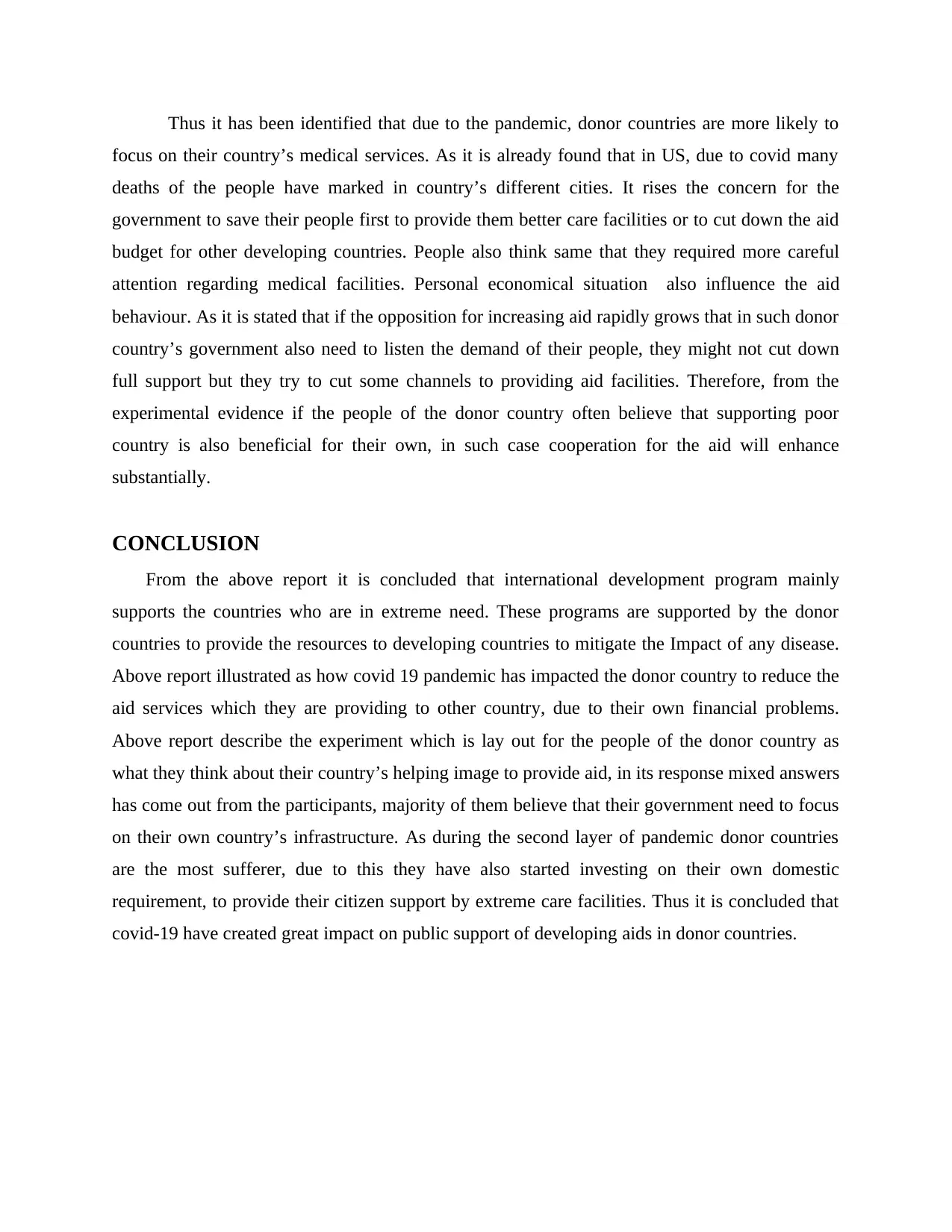
Thus it has been identified that due to the pandemic, donor countries are more likely to
focus on their country’s medical services. As it is already found that in US, due to covid many
deaths of the people have marked in country’s different cities. It rises the concern for the
government to save their people first to provide them better care facilities or to cut down the aid
budget for other developing countries. People also think same that they required more careful
attention regarding medical facilities. Personal economical situation also influence the aid
behaviour. As it is stated that if the opposition for increasing aid rapidly grows that in such donor
country’s government also need to listen the demand of their people, they might not cut down
full support but they try to cut some channels to providing aid facilities. Therefore, from the
experimental evidence if the people of the donor country often believe that supporting poor
country is also beneficial for their own, in such case cooperation for the aid will enhance
substantially.
CONCLUSION
From the above report it is concluded that international development program mainly
supports the countries who are in extreme need. These programs are supported by the donor
countries to provide the resources to developing countries to mitigate the Impact of any disease.
Above report illustrated as how covid 19 pandemic has impacted the donor country to reduce the
aid services which they are providing to other country, due to their own financial problems.
Above report describe the experiment which is lay out for the people of the donor country as
what they think about their country’s helping image to provide aid, in its response mixed answers
has come out from the participants, majority of them believe that their government need to focus
on their own country’s infrastructure. As during the second layer of pandemic donor countries
are the most sufferer, due to this they have also started investing on their own domestic
requirement, to provide their citizen support by extreme care facilities. Thus it is concluded that
covid-19 have created great impact on public support of developing aids in donor countries.
focus on their country’s medical services. As it is already found that in US, due to covid many
deaths of the people have marked in country’s different cities. It rises the concern for the
government to save their people first to provide them better care facilities or to cut down the aid
budget for other developing countries. People also think same that they required more careful
attention regarding medical facilities. Personal economical situation also influence the aid
behaviour. As it is stated that if the opposition for increasing aid rapidly grows that in such donor
country’s government also need to listen the demand of their people, they might not cut down
full support but they try to cut some channels to providing aid facilities. Therefore, from the
experimental evidence if the people of the donor country often believe that supporting poor
country is also beneficial for their own, in such case cooperation for the aid will enhance
substantially.
CONCLUSION
From the above report it is concluded that international development program mainly
supports the countries who are in extreme need. These programs are supported by the donor
countries to provide the resources to developing countries to mitigate the Impact of any disease.
Above report illustrated as how covid 19 pandemic has impacted the donor country to reduce the
aid services which they are providing to other country, due to their own financial problems.
Above report describe the experiment which is lay out for the people of the donor country as
what they think about their country’s helping image to provide aid, in its response mixed answers
has come out from the participants, majority of them believe that their government need to focus
on their own country’s infrastructure. As during the second layer of pandemic donor countries
are the most sufferer, due to this they have also started investing on their own domestic
requirement, to provide their citizen support by extreme care facilities. Thus it is concluded that
covid-19 have created great impact on public support of developing aids in donor countries.
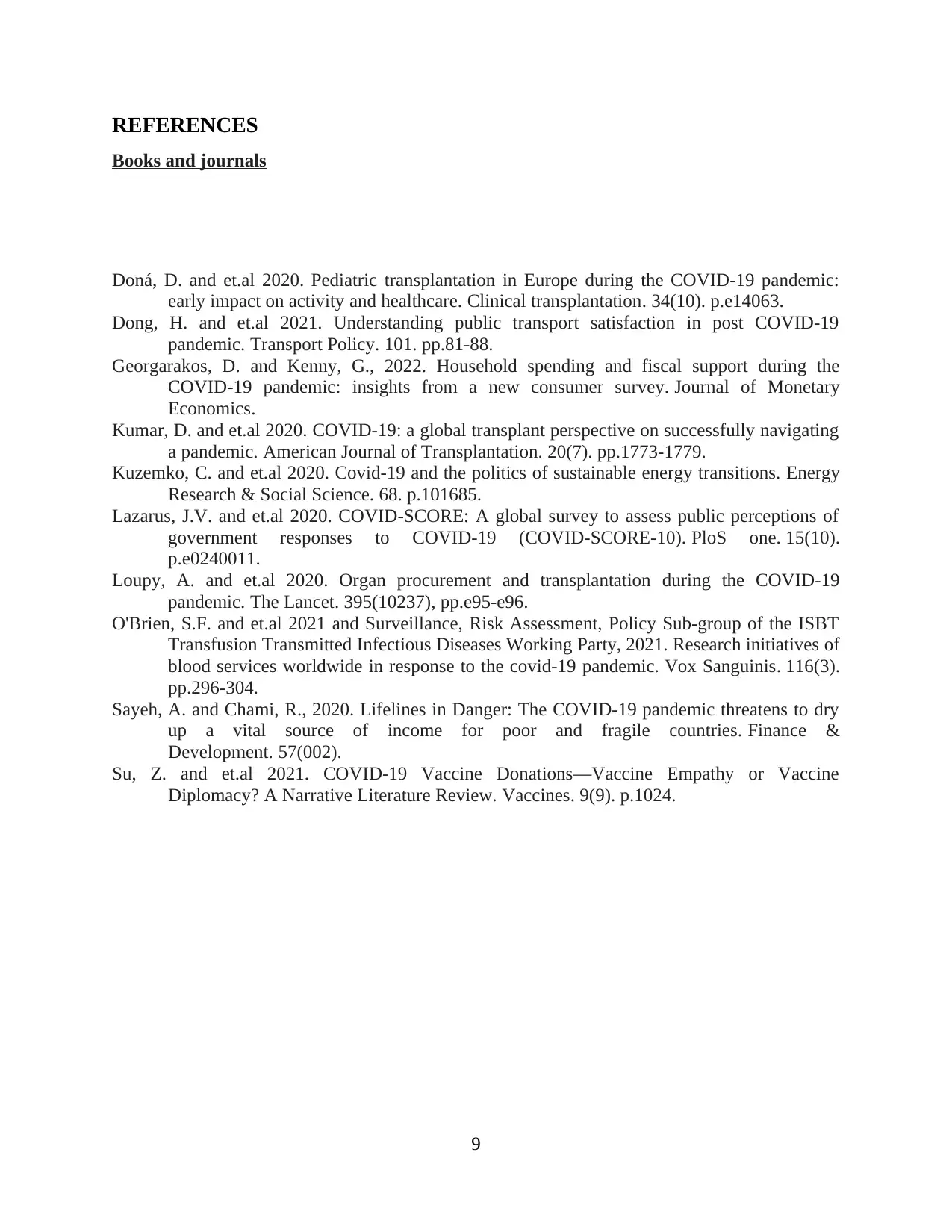
REFERENCES
Books and journals
Doná, D. and et.al 2020. Pediatric transplantation in Europe during the COVID‐19 pandemic:
early impact on activity and healthcare. Clinical transplantation. 34(10). p.e14063.
Dong, H. and et.al 2021. Understanding public transport satisfaction in post COVID-19
pandemic. Transport Policy. 101. pp.81-88.
Georgarakos, D. and Kenny, G., 2022. Household spending and fiscal support during the
COVID-19 pandemic: insights from a new consumer survey. Journal of Monetary
Economics.
Kumar, D. and et.al 2020. COVID‐19: a global transplant perspective on successfully navigating
a pandemic. American Journal of Transplantation. 20(7). pp.1773-1779.
Kuzemko, C. and et.al 2020. Covid-19 and the politics of sustainable energy transitions. Energy
Research & Social Science. 68. p.101685.
Lazarus, J.V. and et.al 2020. COVID-SCORE: A global survey to assess public perceptions of
government responses to COVID-19 (COVID-SCORE-10). PloS one. 15(10).
p.e0240011.
Loupy, A. and et.al 2020. Organ procurement and transplantation during the COVID-19
pandemic. The Lancet. 395(10237), pp.e95-e96.
O'Brien, S.F. and et.al 2021 and Surveillance, Risk Assessment, Policy Sub‐group of the ISBT
Transfusion Transmitted Infectious Diseases Working Party, 2021. Research initiatives of
blood services worldwide in response to the covid‐19 pandemic. Vox Sanguinis. 116(3).
pp.296-304.
Sayeh, A. and Chami, R., 2020. Lifelines in Danger: The COVID-19 pandemic threatens to dry
up a vital source of income for poor and fragile countries. Finance &
Development. 57(002).
Su, Z. and et.al 2021. COVID-19 Vaccine Donations—Vaccine Empathy or Vaccine
Diplomacy? A Narrative Literature Review. Vaccines. 9(9). p.1024.
9
Books and journals
Doná, D. and et.al 2020. Pediatric transplantation in Europe during the COVID‐19 pandemic:
early impact on activity and healthcare. Clinical transplantation. 34(10). p.e14063.
Dong, H. and et.al 2021. Understanding public transport satisfaction in post COVID-19
pandemic. Transport Policy. 101. pp.81-88.
Georgarakos, D. and Kenny, G., 2022. Household spending and fiscal support during the
COVID-19 pandemic: insights from a new consumer survey. Journal of Monetary
Economics.
Kumar, D. and et.al 2020. COVID‐19: a global transplant perspective on successfully navigating
a pandemic. American Journal of Transplantation. 20(7). pp.1773-1779.
Kuzemko, C. and et.al 2020. Covid-19 and the politics of sustainable energy transitions. Energy
Research & Social Science. 68. p.101685.
Lazarus, J.V. and et.al 2020. COVID-SCORE: A global survey to assess public perceptions of
government responses to COVID-19 (COVID-SCORE-10). PloS one. 15(10).
p.e0240011.
Loupy, A. and et.al 2020. Organ procurement and transplantation during the COVID-19
pandemic. The Lancet. 395(10237), pp.e95-e96.
O'Brien, S.F. and et.al 2021 and Surveillance, Risk Assessment, Policy Sub‐group of the ISBT
Transfusion Transmitted Infectious Diseases Working Party, 2021. Research initiatives of
blood services worldwide in response to the covid‐19 pandemic. Vox Sanguinis. 116(3).
pp.296-304.
Sayeh, A. and Chami, R., 2020. Lifelines in Danger: The COVID-19 pandemic threatens to dry
up a vital source of income for poor and fragile countries. Finance &
Development. 57(002).
Su, Z. and et.al 2021. COVID-19 Vaccine Donations—Vaccine Empathy or Vaccine
Diplomacy? A Narrative Literature Review. Vaccines. 9(9). p.1024.
9
⊘ This is a preview!⊘
Do you want full access?
Subscribe today to unlock all pages.

Trusted by 1+ million students worldwide
1 out of 9
Related Documents
Your All-in-One AI-Powered Toolkit for Academic Success.
+13062052269
info@desklib.com
Available 24*7 on WhatsApp / Email
![[object Object]](/_next/static/media/star-bottom.7253800d.svg)
Unlock your academic potential
Copyright © 2020–2026 A2Z Services. All Rights Reserved. Developed and managed by ZUCOL.


